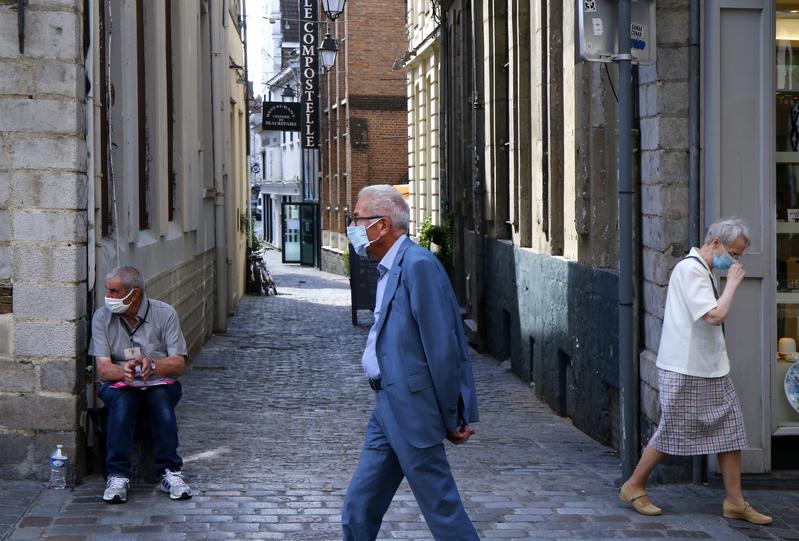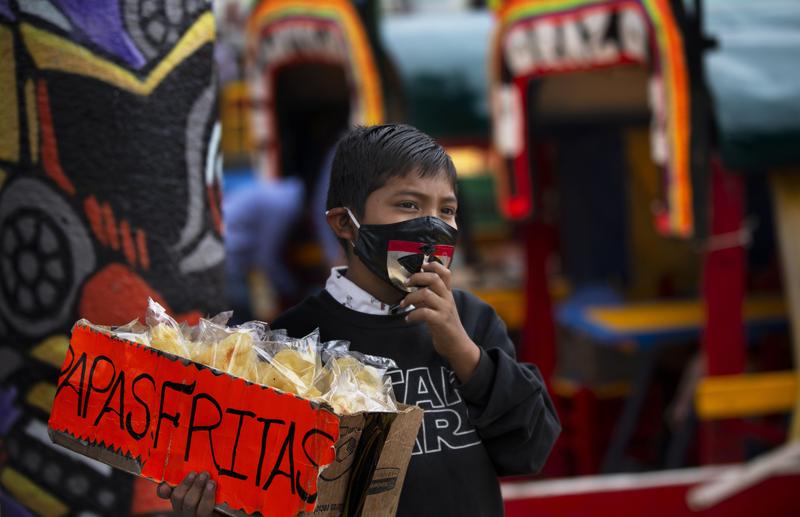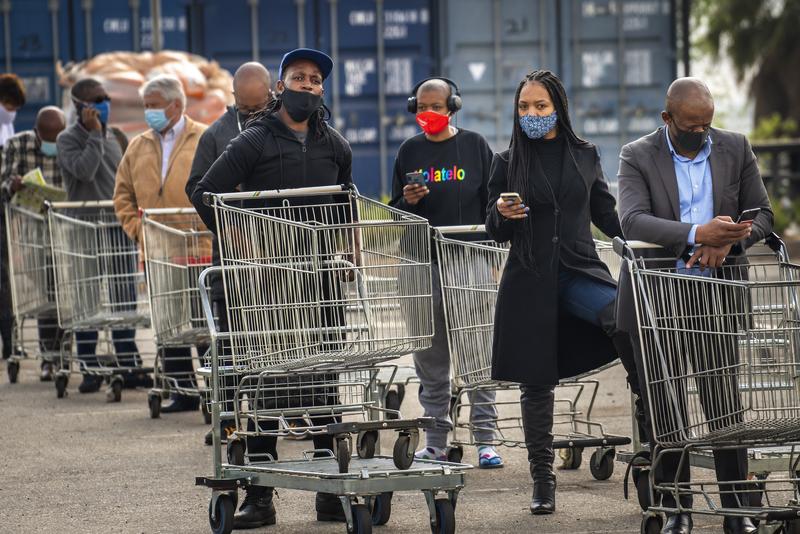 People wearing protective face masks as a precaution against the coronavirus are seen in a street of Lille, northern France, Aug 21, 2020. (MICHEL SPINGLER / AP)
People wearing protective face masks as a precaution against the coronavirus are seen in a street of Lille, northern France, Aug 21, 2020. (MICHEL SPINGLER / AP)
MEXICO CITY / GENEVA / LAGOS / STOCKHOLM / WASHINGTON / MADRID / BUENOS AIRES / WARSAW / QUITO / JOHANNESBURG / BERLIN / MOSCOW - Europe’s renewed surge in COVID-19 cases appears to be less deadly than the original wave several months ago, data show. Increased testing is catching the disease earlier, and in contrast to spikes in March and April -- when the pandemic ripped through nursing homes -- authorities are doing a better job of protecting the elderly and other vulnerable people, according to scientists.
However, others caution that as infections in most European countries began climbing only a few days or weeks ago, deaths could rise again too given the lag between infection and death.
Argentina
The Argentine Health Ministry on Friday confirmed 8,159 new COVID-19 cases and 213 more deaths over the last 24 hours, taking the national caseload to 329,043 and the death toll to 6,730.
Of the new cases, 5,322 were confirmed in the province of Buenos Aires and 1,179 in the city of Buenos Aires, the hard-hit districts with the number of cases accounting for over 87 percent of the country's total cases.
The health authorities also reported that 239,806 people have recovered from the disease so far.
Brazil
The coronavirus crisis in Brazil appears to be leveling off, if not easing, the World Health Organization said on Friday, offering a chink of light for the world’s second biggest COVID-19 hot spot.
The number of weekly infections detected have stabilized, transmissions are slowing, and intensive care units are under less pressure, Mike Ryan, WHO’s top emergency expert, told a news conference in Geneva.
The latest figures show that Brazil has recorded more than 3.5 million cases of the new coronavirus and more than 112,000 deaths related to the virus. Both are the second highest totals in the world, behind only the United States.
President Jair Bolsonaro has come under heavy criticism at home and abroad for his handling of the crisis. He has dismissed the virus as nothing more than a “little flu”, frequently appears in public without a mask, and when asked by one journalist about the soaring death toll, said “So what?”
Ryan urged caution, however. Brazil is a huge country and many parts of it are still seeing increases in the number of cases, while the number of daily cases is still around 50,000-60,000 and the death toll still over 1,000 on most days, he said.
Bulgaria
The number of confirmed COVID-19 cases in Bulgaria has reached 15,131 after 169 new infections were reported in the last 24 hours, official figures showed Saturday morning.
Meanwhile, seven patients have died, bringing the nationwide death toll to 539, while the number of recoveries from COVID-19 rose by 195 to 10,282, the country's health ministry said.
Ecuador
Ecuador's Ministry of Public Health on Friday reported a total of 106,481 cases of novel coronavirus infection and 6,248 deaths since the onset of the outbreak.
In the previous 24 hours, tests detected 973 new cases and 48 more patients died.
Germany
At least 41 schools in Berlin have reported that students or teachers have become infected with COVID-19, less than two weeks after schools in Germany’s capital reopened, the AP reports. Hundreds of students and teachers are in quarantine, the Daily Berliner Zeitung newspaper reported.
Berlin was one of the first places in Germany to reopen its schools after the summer holidays.
The number of confirmed coronavirus cases in Germany increased by 2,034 to 232,082, data from the Robert Koch Institute (RKI) for infectious diseases showed on Saturday.
The reported death toll rose by 7 to 9,267, the tally showed.
 A child, wearing a protective face mask, hawks bags of potato chips near a row of painted wooden boats known as trajineras, popular with tourists that ply the water canals in the Xochimilco district of Mexico City, during a reopening of activities after a six-month pause due to the COVID-19 pandemic. (MARCO UGARTE / AP)
A child, wearing a protective face mask, hawks bags of potato chips near a row of painted wooden boats known as trajineras, popular with tourists that ply the water canals in the Xochimilco district of Mexico City, during a reopening of activities after a six-month pause due to the COVID-19 pandemic. (MARCO UGARTE / AP)
Mexico
The pandemic is being underdiagnosed in Mexico and many people are being diagnosed late, World Health Organization official Michael Ryan said in a Canadian Broadcasting Corporation webcast.
Mexico is carrying out about three tests per 100,000 people, with a positive rate of almost 50 percent, Ryan said. There’s a sharp difference in mortality between rich and poor localities, he said.
Mexico’s health ministry on Friday reported 5,928 new confirmed cases of coronavirus infection and 504 additional fatalities, bringing the total in the country to 549,734 cases and 59,610 deaths.
The government has said the real number of infected people is likely significantly higher than the confirmed cases.
Nigeria
Nigeria will bar entry to nationals of countries that do not allow Nigerians to enter amid the new coronavirus pandemic, the aviation minister said on Friday.
Nigeria is preparing to re-open its airports to international flights on Aug 29, for the first time since March, and is developing the rules and protocols to enable the resumption.
Minister Hadi Sirika told airline and travel industry representatives on a Zoom call late on Friday that a reciprocal ban on travel would apply to both airlines and citizens.
Nigeria has 50,951 confirmed coronavirus cases and 992 deaths.
Poland
The Health Ministry of Poland on Friday reported 903 new cases in past 24 hours, a new record, raising the number of confirmed COVID-19 cases in the country to 60,281.
It followed weeks of steady increase in daily new cases from between 300 and 400 in June and July to over 500 in August so far. Totally 1,938 people have died from the COVID-19 in Poland, official statistics showed.
Russia
Russia registered 4,921 new COVID-19 cases in the past 24 hours, taking its total to 951,897, the country's COVID-19 response center said in a statement Saturday.
Meanwhile, 121 new deaths were reported, taking the nationwide count to 16,310, according to the statement.
Moscow, the country's worst-hit region, reported 687 newly confirmed cases, taking its tally of infections to 256,513, the response center said.
According to the statement, 767,477 people have recovered so far, including 6,147 over the past day.
 Customers lineup to enter an hyper store in Johannesburg, South Africa, Aug 18, 2020. (JEROME DELAY / AP)
Customers lineup to enter an hyper store in Johannesburg, South Africa, Aug 18, 2020. (JEROME DELAY / AP)
South Africa
South Africa’s confirmed COVID-19 cases have surpassed 600,000, the health ministry said on Friday, although the number of new cases has been declining since a peak in July.
Despite imposing one of the world’s toughest lockdowns at the end of March when the country had only a few hundred cases, South Africa saw a surge in coronavirus infections that has left it the hardest hit on the continent.
The ministry said in a statement South Africa now had a total of 603,338 cases and 12,843 deaths - accounting for more than half of the continent’s cases and around 47 percent of its deaths, according to a Reuters tally of government and World Health Organization data.
Africa’s most industrialised economy reported 3,398 new cases on Friday, compared with a peak of over 13,000 cases a day seen in July.
The COVID-19 crisis has battered an economy already in recession and pushed millions of South Africans deeper into extreme poverty.
The government eased lockdown restrictions this week to allow most of the economy to re-open. But President Cyril Ramaphosa cautioned that cases could surge if people failed to maintain vigilance.
Spain
Authorities in Madrid on Friday advised residents in areas with a high level of coronavirus cases to stay at home as the Spanish health ministry reported more than 3,000 new infections for the fourth day running.
The country logged 3,650 coronavirus infections in the past 24 hours, bringing the cumulative total to 386,054. With 1,199 infections, Madrid accounted for nearly a third of the new cases.
The region’s deputy health chief, Antonio Zapatero, urged people to avoid unnecessary trips and meetings, and said those in the worst-hit areas should stay at home, though he ruled out any mandatory confinement for now.
A total of 28,838 people in Spain have been killed in the epidemic. The government to impose a strict lockdown in March until the situation eased in June.
In an effort to stall a resurgence, the national government has shut down night clubs, told restaurants to close at 1 am and all but banned smoking in public.
READ MORE: Spain: Coronavirus traces found in March 2019 sewage sample
Sweden
Sweden has chosen the right strategy in fighting the spread of the new coronavirus, Prime Minister Stefan Lofven said on Friday, defending his government’s decision not to adopt a strict lockdown as many European countries have done.
More than 5,800 Swedes have died of COVID-19, a much higher death rate than in neighbouring Norway, Denmark and Finland which adopted much tougher measures than Sweden, leading many to question the government’s approach.
But Lofven said Sweden had made the correct choice.
Lofven also defended the decision by the Public Health Agency not to enforce the wearing of facemasks, as many European countries have done, to fight the spread of the virus.
 View of the construction site of a new section of the border wall between the US city of El Paso, Texas and Ciudad Juarez, Chihuahua state, Mexico on Aug 17, 2020. (HERIKA MARTINEZ / AFP)
View of the construction site of a new section of the border wall between the US city of El Paso, Texas and Ciudad Juarez, Chihuahua state, Mexico on Aug 17, 2020. (HERIKA MARTINEZ / AFP)
US
The United States on Friday closed lanes at select ports of entry at the border with Mexico and will conduct more secondary checks to limit non-essential travel and the spread of coronavirus, a US Customs and Border Protection (CBP) official said.
Non-essential travel has been restricted at the border since March, but US citizens and permanent residents can still enter the United States from Mexico. The new measures are aimed at those travelers, the CBP official said.
US President Donald Trump, who faces re-election Nov 3, has taken a series of sweeping steps to scale back immigration during the coronavirus pandemic, including emergency border rules that allow US authorities to rapidly deport migrants arrested at the border.
The United States leads the world with more than 174,000 confirmed deaths from the coronavirus, followed by Brazil with 112,000 and Mexico with 59,000, according to a Reuters tally.
CBP said it would take steps to reduce non-essential travel at more than a dozen border crossings in Texas, Arizona and California. The wait times for passenger vehicles at those ports of entry on Friday evening ranged from no wait to several hours.
Hospitals should drop using the anti-malarial drug hydroxychloroquine altogether to treat COVID-19 patients, even if it’s in a clinical trial, according to new medical guidelines.
The Infectious Diseases Society of America revised its COVID-19 treatment guidelines Friday, toughening its stance against the use of the anti-malarial drug that’s been widely touted by Trump as a way to deal with the pandemic.
IDSA now recommends not to use hydroxychloroquine either by itself or along with the antibiotic azithromycin for patients with the coronavirus, even in hospitals. The society previously called for limited use of hydroxychloroquine in trials.
ALSO READ: Canada, US extend border restrictions to control virus spread
UK
Travelers from France to the United Kingdom will be required to self-certify that they are not suffering coronavirus symptoms or have been in contact with a confirmed case within 14 days preceding travel, the British government said on Friday.
The United Kingdom has said travelers returning from France on or after Aug 15 should self-isolate upon their return, due to high COVID-19 infection rates in France.
The imposition of quarantine conditions have hit Britons’ favourite holiday destinations in the middle of summer and as the travel industry fights for survival.


